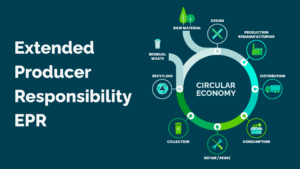GS3 – Environment

Extended Producer Responsibility (EPR) is an environmental policy approach under which producers are given a significant responsibility—financial and/or physical—for the treatment or disposal of post-consumer products. The objective is to shift the burden of waste management from local governments to the producers.
Salient Features:
| Aspect | Description |
| Legal Basis (India) | EPR is mandated under the Environment (Protection) Act, 1986, and specific rules like: |
- Plastic Waste Management Rules, 2016 (amended 2022)
- E-Waste (Management) Rules, 2022
- Battery Waste Management Rules, 2022 |
Salient Features
| Aspect | Details |
| Responsibility | Assigned to Producers, Importers, and Brand Owners (PIBOs). |
| Scope | Covers various waste streams including plastic packaging, e-waste, batteries, tyres, etc. |
| Operational Mechanism | Obligates producers to collect and responsibly recycle or dispose of a portion of the products they introduce into the market. |
| EPR Certificates | Compliance is achieved by purchasing EPR certificates from certified recyclers. |
| Digital Oversight | Utilises centralised online platforms like CPCB’s EPR portal for registration, reporting, and compliance monitoring. |
Objectives of EPR:
- Promote Circular Economy: Encourage reuse, recycling, and reduction in raw material use.
- Reduce Environmental Impact: Minimise pollution and resource extraction.
- Ensure Product Stewardship: Make producers accountable beyond the point of sale.
- Improve Recycling Infrastructure: Generate investment in collection, segregation, and processing facilities.
- Reduce Burden on Municipalities: Transfer cost and responsibility to those who generate the waste.
Implementation in India:
- Plastic Waste Management (Amendment) Rules, 2022:
- Introduces EPR targets for plastic packaging (categories I–IV).
- Mandates recycling, reuse, and end-of-life disposal norms.
- Prohibits use of certain single-use plastic items.
- E-Waste Management Rules, 2022:
- Includes new categories such as lighting equipment, solar panels, and thermometers.
- Imposes mandatory take-back and channelisation of e-waste to authorised recyclers.
- Battery Waste Management Rules, 2022:
- Based on the principles of Extended Producer Responsibility.
- Introduces recovery targets for different battery chemistries.
- Ensures environmental and health safeguards in battery disposal.
Challenges in EPR Implementation:
- Informal Sector Dominance: A large portion of waste is handled by the informal sector, which is not integrated into formal EPR systems.
- Low Awareness Among Producers: Many small businesses lack knowledge of compliance requirements.
- Poor Monitoring and Enforcement: Inadequate tracking of actual collection and recycling against claims.
- EPR Certificate Misuse: Concerns about fraud, false reporting, and lack of transparency.
- Lack of Infrastructure: Especially in rural or semi-urban areas, collection and recycling units are insufficient.
Recent Developments:
- Digital Platforms: Central Pollution Control Board (CPCB) launched EPR registration portals for plastics, batteries, and e-waste.
- EPR Credit Trading: Market-based mechanism allowing producers to buy credits from certified recyclers to meet targets.
- Increased Penalties: Non-compliance now attracts stricter environmental compensation.
- Circular Economy Committees: NITI Aayog and MoEFCC have proposed sector-specific circular economy action plans involving EPR.
Way Forward:
- Strengthen Monitoring: Use blockchain or GPS-enabled waste tracking for real-time monitoring.
- Formalise Informal Sector: Integrate waste pickers and small recyclers into official systems with training and incentives.
- Capacity Building: Create awareness among producers, especially MSMEs.
- Infrastructure Development: Increase investment in authorised recycling facilities.
- Robust Auditing: Independent third-party audits of EPR obligations and certifications.
EPR is a vital tool in India’s strategy for sustainable waste management and circular economy. While policies have evolved, effective implementation, stakeholder awareness, and regulatory enforcement are essential to realise its full potential.




